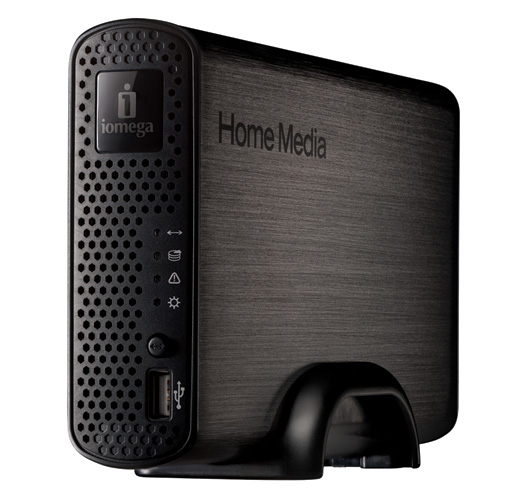
Iomega’s Home Media Network Hard Drive Cloud Edition
Every big consumer IT company — like Apple with its iCloud, Microsoft with SkyDrive, and Amazon with Cloud Drive — is moving into some kind of cloud-based storage sharing solution in the marketplace.
Don’t even mention the dozens of smaller companies in this space like trailblazer Dropbox, Tonido and Pogoplug out there.
Now even consumer product manufacturers are moving in on the act to enable “cloud sharing” on their devices.
At a media launch in Singapore today, storage vendor Iomega trotted out their new range of Network Attached Storage (NAS) devices that allow people to share data with others on their new personal cloud.
Basically it allows other machines to download, upload and even sync data with the NAS devices — after having been given permission by the owner of course — via authenticating through an Iomega server. It’s backed by an AES 128-bit key encryption, so it defeats man-in-the-middle hijacks.
Currently the devices work on Windows, Mac and Linux platforms, with support for iOS included. According to the Iomega folks, support for Android is on the way.
Actually, I like the home media network hard drive cloud editions Iomega were showing off today. The 1TB and 2TB versions are being sold at US$189.99 (S$209) and $S299.99 (S$283), which has fairly decent specs, device support and software bundled in for such a price point.
These products were just available in Singapore during the recent PC Show 2011 at Suntec City last weekend.
File sharing made easy
Adding in easy file sharing and syncing capabilities was a smart move on Iomega’s part, and I suspect it might become a huge hit with casual users.
I know several savvy geek friends who already run file servers that friends can FTP into, but the pitch for Iomega’s personal cloud is that it is easier to use. Invite a friend via an email address, authenticate through a web interface to Iomega servers, which will then create a secure tunnel for file sharing.
It’s not anywhere new though, and just drawing from a local example I’ve seen slivers of this technology on our homegrown Singapore iTwin product almost two years back, about a year-and-a-half before Iomega announced this in January this year at the Consumer Electronic Show in Las Vegas.
Sure iTwin is point-to-point, auto-discovery of dongle, and even more brain-dead simple to use as its just plug-and-play, but it’s essentially a similar secure remote access file sharing technology.
I think Iomega’s NAS drives with their “cloud” capability is a far stronger proposition though. Storage is a product that businesses and people consume more and more, given that we live in a world of increasing data explosion.
Will people buy iTwin just for remote file sharing, however simple? Not sure about that.
Just how many more flavours of cloud do we have?
And finally a rant that’s entirely off topic.
As a cranky curmudgeon, I’ve already written reams about the bastardization of the term “cloud” just because it is the in-word.
Essential to the cloud definition, at least in the past, was that the application or data is hosted off-premises. Does turning your PC into a miniaturized data centre for friends justify coining yet another version of the cloud word?
Apparently yes.
You know, not too long ago, we had a term for this definition of “personal cloud”: It’s called remote access and file sharing.
Sigh.






@ginlee
Yup, it’s similar functionally, but not exactly the same I think.
First, it’s convenience. If I understand it right, there’s a DNS service that Iomega runs that maps back to your NAS. No need to give IP address of your NAS, it’s “auto discovered” by the Iomega servers. Login to this Iomega server and it points back to your machine.
Two, support for mobile browsers, i.e. the iOS. From your iPad or iPhone, you can pull the documents off your NAS anywhere.
Lastly, security. I think you only have to invite your friends once via email. Once they download the client and get the encrypted AES key to login, both sides can see the shared drives directory.
If I got this wrong, if any Iomega folks are reading this do help me out!
bro so what is the difference with remote access – a standard feature with all NAS, I give my friend a web link, user ID and password and he can access my NAS wat. This is the question I am asking the intern I sent to cover the event.
I’m surprised there hasn’t been more consumer products like this years ago. Sure, like you say, it’s nothing new really. However, making it dead simple for the casual user is the key and it’s not at all common place in the market. Especially now that devices like tablets are often lacking usb host control these “personal clouds” could be a big hit. I would take them over a WiFi hard drive–who wants to drag a hard drive around with them when they can access it from anywhere?